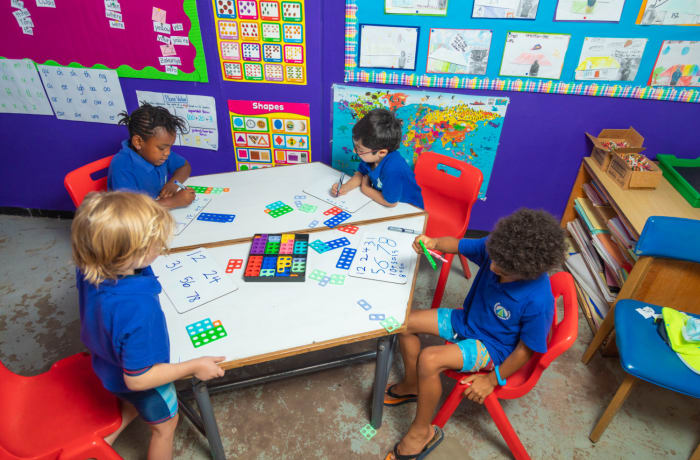
Pre-School - Tuition Fees
The philosophy of the Pre-School programme is to help children develop their self-awareness and to become confident and independent. Play is an important aspect of Pre-School and we aim to provide an attractive environment that will stimulate learning. Children are given the opportunity to investigate and experiment at their own pace and to foster their own interests. School is seen as an extension of the home and it makes use of the cultural diversity present in the classroom as a basis for recognizing the value of each and every culture represented.
$4,796 per pupil
Select your options
Tuition Plans
Grade
Details
Please include a valid payment reference which is ISL followed by student no. (e.g.ISL00000)
NEW
Buy online
This product is available for online purchase — Buy online now and pick it up instore or get it delivered to you.
| Language | While we teach in English, other languages are always encouraged and home languages are celebrate |
|---|---|
| Speaking and Listening | The children are given the opportunity to listen, retell and respond purposefully, both individually and in groups. They learn social skills such as the ability to discuss issues constructively, to predict what might happen next, to explain what happened in the story and to respect the views of others. |
| Reading | Familiarity with books is seen as an encouragement to read. We aim to teach the children about books,their design and their purpose. The development of reading skills is dependent on the overall development of the child. They are given examples of non-fiction, fiction and poetry and encouraged to read along with appropriate stories. The children also learn to recognize the letter sounds introduced. |
| Writing | Children develop pre-writing coordination and fine motor skills through a variety of activities. When a child is ready they begin to develop writing skills such as pencil grip, and left & right progression skills.The development of fine and gross motor control is particularly important at this stage of writing. |
| Art | Art is one of the ways in which children learn as they investigate, experiment, look more closely, question, and make decisions all in their own way and time. The aim is to develop self-confidence and independence of choice. We encourage the use of a variety of mediums and materials to give the children opportunities to create their own views of their environment |
| Mathematics | Maths is not always about paper and pencil; it is a very practical subject. At this age we aim to develop the idea that mathematics is fun. Topics covered include: sorting; matching; one-to-one correspondence; simple sets; basic shapes; comparisons of size, weight, length, & height; counting; number symbol recognition concept of time; and basic number and mathematical vocabulary development. These skills are taught through play, rhymes and practical methods. |
| Music | The aim of music education is to induce and foster in every child a love and appreciation of music. The programme seeks to develop a sense of joy and achievement in individual expression and teamwork through the medium of music. |
| Physical Education | We aim to develop student skills through swimming, games, dance and gymnastic activities. Students move creatively and spontaneously to music in dance. In games, students develop coordination and build up skills through practiced use of varied apparatus. In swimming, students develop water confidence fundamentals through a series of varied activities. The focus is on activities progressing from Step 1 upwards. |
| Personal and Social Development | We provide an ideal setting to encourage sharing and “turn-taking”. Children learn to feel comfortable within the daily routines and to know what is expected of them. They are able to help and support each other through their ideas and actions, and to share a range of responses and feelings. |
| Units of Inquiry | In keeping within the philosophy of the International Baccalaureate Primary Years Programme (PYP), Social Studies and Science will be taught within Units of Inquiry. These Units will run for approximately 8 weeks and will incorporate as many subjects as appropriate. |
| Zambian Studies | Pre-school aims to give your child a broad and balanced introduction to life at school preparing them to enter school through the Reception programme. We aim to make Pre-school enjoyable, stimulating, rewarding, and most of all fun. |
Enquire about this item
Enquire via Email
Contact supplier
International School of Lusaka
Early learning
Lusaka
The Early Years Department at the International School of Lusaka offers education to children aged two to seven years, with Nursery classes, Pre-school, Reception, Year One and Year Two classes. Classrooms are spacious and well-resourced, and playgrounds are extensive. The campus is located in a clean and safe environment.
International School of Lusaka
Pre-school
Lusaka
Run a business in Zambia?
© 2021 Infobwana, Ltd. All rights reserved. Formally thebestofzambia.com · Learn more

